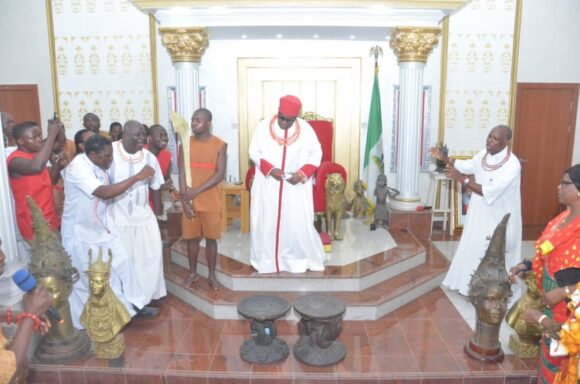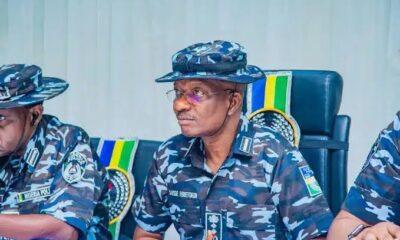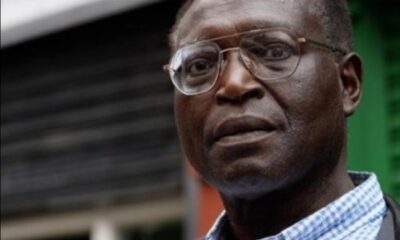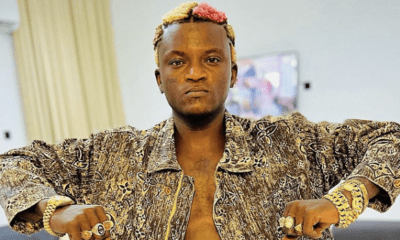News
Countries With The Highest Number Of Public Holidays In The World
Published
1 year agoon
By
Editor
With over 190 countries in the world, it is expected that there are differences and similarities in each nation’s affairs and one significant aspect of difference in the running of the nations of the world is the number of public holidays celebrated. While some countries enjoy a wide range of public holidays others do not.
Countries celebrate national holidays for different reasons including religious observances, national days, remembrance days or days to commemorate some other special historical event unique to a certain state, country, or region.
Discussed in this article are 10 countries with the highest number of public or national holidays in the world.
1. Myanmar
Myanmar, officially the Republic of the Union of Myanmar, formerly known as Burma, is a country in Southeast Asia. It is the largest country in Mainland Southeast Asia, and has a population of about 54 million as of 2017.
READ ALSO: Edo Govt Approves Fees For Exam Registration, Practical In Schools
Myanmar has a total of 32 public holidays with some holidays lasting as long as 5 days to 8 days.
The country’s multicultural makeup helps it secure the top spot on this list.
There are numerous religious public holidays, such as the Start of Buddhist Lent (date varies), Christmas (25th December), Eid-ul-Adha (date varies) and Diwali (date varies), as well as historic days such as Independence Day (4th January) and Resistance Day (27th March).
2. Nepal
Nepal, an Asian country lies along the southern slopes of the Himalayan mountain ranges.
It is a landlocked country located between India to the east, south, and west and the Tibet Autonomous Region of China to the north. Its territory extends roughly 500 miles (800 kilometres) from east to west and 90 to 150 miles from north to south. The capital is Kathmandu.
Nepal is the second on this list with a total number of 30 public holidays.
Along with an impressive number of public holidays, Nepal also has a standard six working days a week. Like Myanmar, Nepal’s diverse culture contributes to the country’s many different religious and non-religious public holidays.
3. Iran
Iran, officially the Islamic Republic of Iran and also called Persia, is a country in Western Asia. It covers an area of 1,648,195 km2 (636,372 sq. mi), making it the fourth-largest country entirely in Asia and the second-largest country in Western Asia behind Saudi Arabia. Iran has a population of 85 million, making it the 17th-most populous country in the world, and the second-largest in the Middle East.
Iran has a complex public holiday system, with many ‘unofficial’ public holidays added each year leading to the annual total reaching beyond 26.
READ ALSO: Two Feared Dead In Effurun Auto Crash
The vast majority of Iran’s public holidays are based on important days and events in the Islamic calendar; because Iran uses both the solar and lunar Hijri calendars, there are few set dates for their public holidays.
4. Sri Lanka
Sri Lanka, formerly known as Ceylon and officially the Democratic Socialist Republic of Sri Lanka, is an island country in South Asia. It lies in the Indian Ocean, southwest of the Bay of Bengal, and southeast of the Arabian Sea; it is separated from the Indian subcontinent by the Gulf of Mannar and the Palk Strait.
The total number of public holiday celebrated in Sri Lanka is 25 as the country celebrates a wide variety of religious holidays and many interconnecting holidays that are specific to the country.
5. Malaysia
The fifth on the list of countries with the highest number of the public holiday is Malaysia with a total number of 23-25 holidays in a year.
Malaysia is a Southeast Asian country occupying parts of the Malay Peninsula and the island of Borneo. It’s known for its beaches, rainforests and mix of Malay, Chinese, Indian and European cultural influences.
Public holidays in Malaysia are largely secular and reflect the presence of a wide variety of religions and cultures present within the country.
6. Bangladesh
Bangladesh, officially the People’s Republic of Bangladesh, is a country in South Asia.
It is the eighth-most populous country in the world, with a population exceeding 165 million people in an area of 148,460 square kilometres (57,320 sq. mi). Bangladesh is among the most densely populated countries in the world and shares land borders with India to the west, north, and east, and Myanmar to the southeast; to the south, it has a coastline along the Bay of Bengal.
Bangladesh has up to 22 public holidays and these public holidays are observed for various religious festivals; four for Islamic holidays, two for Hindu holidays, and one each for Buddhist and Christian holidays. In addition to this, there are various national holidays, including Language Martyr’s Day (21st February) and National Mourning Day on 15th August.
7. Egypt
Egypt, officially the Arab Republic of Egypt is a transcontinental country spanning the northeast corner of Africa and the southwest corner of Asia via a land bridge formed by the Sinai Peninsula.
In Egypt, there are 22public holidays but it is important to know that public holidays in Egypt are quite complex.
The public holiday calendar is a mix of religious and non-secular days and is observed according to both the fixed Gregorian calendar and the varying dates of the Islamic lunar calendar.
One recent addition to Egypt’s public holiday roster is Revolution Day (25th January) which was introduced after the public uprisings of 2011.
8. Cambodia
Cambodia is a Southeast Asian nation whose landscape spans low-lying plains, the Mekong Delta, mountains and Gulf of Thailand coastline. Phnom Penh, its capital, is home to the art deco Central Market, the glittering Royal Palace and the National Museum’s historical and archaeological exhibits.
Cambodia has a total number of 21 public holidays.
The vast majority of Cambodia’s public holiday calendar is connected to Buddhist observances, usually in line with the Khmer lunar calendar (but the solar year is used too). This means that the dates of many Cambodian national holidays vary each year.
9. India
India, officially the Republic of India, is a country in South Asia. It is the seventh-largest country by area, the second-most populous country, and the most populous democracy in the world.
The sheer size of India and its extensive history has led to a vast array of public holidays being observed. 21 public holidays are celebrated in India.
Many public holidays are based on various religious festivals (including Islam, Hinduism, Sikhism, Jainism, Buddhism and Christianity).
Despite the prevalence of public holidays in this regard, there are only three national holidays: Republic Day on 26th of January, Independence Day on 15th of August, and Gandhi Jayanti (Gandhi’s birthday) on 2nd of October.
10. Liechtenstein
READ ALSO: 2023: Atiku, Tinubu Fight Dirty In Bid To Succeed Buhari
Liechtenstein is a German-speaking, 25km-long principality between Austria and Switzerland. It’s known for its medieval castles, alpine landscapes and villages linked by a network of trails. The capital, Vaduz, a cultural and financial centre, is home to Kunstmuseum Liechtenstein, with galleries of modern and contemporary art.
This European country has a lot of public holidays between the range of 20-22. Many of Liechtenstein’s public holidays are based around Christian celebrations such as Easter and Christmas. There are some lesser-known public holidays such as Whit Monday (June) and Mary’s Birth (September).
There are also two public holidays which are marked as such on calendars but are not legally recognised. They are Shrove Tuesday (sometimes referred to as “Pancake Day”) and Saint Berchtold’s Day, on 2nd January.
Tribune online
You may like
News
Shettima Launches NEDC’s School Enrollment Drive Programme
Published
2 hours agoon
May 18, 2024By
Editor
Vice President Kashim Shettima has launched the Accelerated Senior Secondary School Education Programme (ASSEP) initiated by the North-East Development Commission (NEDC) in collaboration with the office of the VP to enhance child enrollment drive in schools within the North-East sub-region.
Speaking during the launching of the programme in Bauchi on Saturday, the VP said that consequences of the nation’s action and inaction were evident in all indices used to assess development.
He said while primary education provides a foundation, secondary education is a bridge, adding that the Northeast sub-region has been the victim of inability to enforce a uniform policy to drive school and the persistent cultural perversion to formal education in the country.
READ ALSO: Excitement, Dance As ‘Looted Ancestral Stools’ Return To Oba Of Benin
“We in the Northeast occupy a quantum of position in ranking of essential services. Education being a key sector of this country, this is especially pronounced in the post primary education, while the Northeast secondary school enrollment drive stands at 19 percent, far below the nation’s 39 percent,” he said.
Earlier, the Managing Director of NEDC, Mohammed Alkali, said that the primary education completion level of 85 per cent in the Northeast is among the best in Nigeria, but secondary school enrolment is a mere 15 per cent, the second worst nationally.
According to him, due to the challenges in the post-primary education segment, JAMB UTME applications and admissions into tertiary institutions in 2019 were the lowest for the Northeast compared to other regions.
READ ALSO: Three Children Rescued As Fire Guts Storey Building In Delta
He added that, nationally, the Northeast has the lowest number of teachers and the highest percentage 55 per cent of those available are without literacy skills.
The MD also revealed that the challenges in the post-primary education segment include weak quality indices and a wide demand-supply gap driven by economic and cultural factors.
“The Accelerated Senior Secondary Education Programme seeks to boost the post primary education rating across the North East region through improved enrolment into tertiary institutions.
“It’s also to improve skills development as well as the elevation of teacher quality. It would pay special focus on Science, Technology, Engineering, Mathematics and communication.
READ ALSO: JUST IN: Tinubu Appoints Governing Board Members For 111 Tertiary Institutions
“These would foster creativity and critical thinking; motivates and inspires young people to generate new technologies and ideas to learn from inquiry-based tasks,” he said.
Alkali also explained that the programme would also raise awareness about after-school possibilities and the potential for diligent students to become successful and prominent contributors to the North East region and Nigeria at large.
He expressed gratitude to the Federal Government especially, the Vice President for the deep interest and commitment to human development in the North-East.
News
Edo Police Break Silence On Operatives Fighting Dirty In Viral Video
Published
2 hours agoon
May 18, 2024By
Editor
By Joseph Ebi Kanjo
The Edo State Police Command says a trending video showing two operatives of the command engaging in a fight is a handiwork of mischief makers.
In the video which has gone viral on the internet, two policemen are seen fighting themselves, while a voice commentary in the background claims they are from the Igueben Decisional Police Station headquarters in the state.
A writeup also attached to a version of the video sighted by Info Daily also claims that the policemen were fighting because of sharing formula of money collected from motorists on the highway. The writeup also claims that the incident happened yesterday, May 17th, 2024.
READ ALSO: Three Children Rescued As Fire Guts Storey Building In Delta
But reacting to the viral video in a statement issued by SP Chidi Nwabuzor, Police Public Relations Officer, the command said contrary to the claim, the incident happened in 2020, adding that disciplinary measures were taken against the erring policemen.
The statement which issued electronically to newsmen in Benin on Saturday evening partly reads: “Edo State Police Command wishes to inform the general public that it’s aware of a video trending on the internet showing two policemen that engaged themselves in a fight in public spaces and wishes to state as follows that;
“The now trending video happened in April 2020 in a community called Ebelle in the Igueben local government area of Edo State.
READ ALSO: JUST IN: Tinubu Appoints Governing Board Members For 111 Tertiary Institutions
“The two erring policemen, namely; (i) F/NO.491112 CPL Ozimeade Aidonojie and (ii) F/NO. 516384 PC Salubi Stephen were attached to Ebelle Police Divisional Headquarters.
“They defaulted, tried in an orderly and upon conviction dismissed from the Force for the offence of discreditable conduct contrary to Paragraph ‘E’ Sub Section 111 of the Police Act and Regulations 370 Cap. P19 of Federation of Nigeria 2004.”
Nwabuzor in the statement reiterated the state Commissioner of Police, Funsho Adegboye, commitment to “making Edo State a desired secured state where the law abiding citizens and the general public go about their lawful businesses in making Edo State economic hubs of Nigeria without fear or intimidation.”
News
Excitement, Dance As ‘Looted Ancestral Stools’ Return To Oba Of Benin
Published
3 hours agoon
May 18, 2024By
Editor
It was a moment of joy, excitement and dance at the palace of the Oba of Benin as the revered monarch, Oba Ewuare II took custody of two looted royal stools from the German government.
They were handed over to the National Commission for Museums and Monuments, NCMM on behalf of the Nigerian government by the German authorities in 2022.
The Director-General of
National Commission for Museums and Monuments, Mr Olugbile Holloway made the presentation on behalf of the Federal Government on Saturday May18, 2024 in Oba of Benin Palace, Benin City.
According to history, the artefacts — Bronze and wooden Royal stools (Ekete), made during the reign of Oba Eresoyen and Oba Esigie several Centuries ago, were looted from Oba Palace during the punitive expedition in 1897.
READ ALSO: Over 100 Priests, Palace Chiefs Storm Court For Oba Of Benin In Solidarity
Addressing the Benin Throne during the presentation of the artefacts, Mr Holloway, pledged on behalf of NCMM, to work-hand-in hand with the Benin Royal Court in uplifting and displaying Edo heritage.
He revealed that as the Benin Bronzes and other art works are gradually making their way home (Nigeria), “NCMM will join hands with the Royal Court to create a befitting destination for people around the world to come and appreciate these works”.
“What you see before us were originally taken away from the Royal family in 1897.
“We have a stool made of Bronze and a wooden stool.
“I speak for every member of my team, to say that we remain loyal to the Royal Court. And if there is anything we can do, we will do to support this laudable initiative.
READ ALSO: Oba Of Benin Suspends Six Officials For Posing As Palace Emissaries To Ooni Of Ife
“This heritage is not just Benin heritage, but Nigeria’s heritage.
When we speak of Benin heritage, there is nobody that doesn’t know the great works of ours.
“I appreciate you, we will always do what we can do with our powers to make His Royal Majesty lineage in memory”, he said.
After unveiling the repatriated Artefacts, Oba of Benin, who danced joyfully to Benin traditional rendition in dramatic dance steps, with excited Chiefs and members of the Royal family, offered prayers to Almighty God and his ancestors.
The traditional ruler, who was visibly overwhelmed with joy, appreciated the German government and the Federal Government and the NCMM leadership for their efforts.
The royal father, thereafter, in a historic move, sat in one of the royal stools (Ekete), and personally presented a chunk of white, which, according to belief, symbolizes peace and blessings to the Director-General of National Commission for Museums and Monuments, Mr Olugbile Holloway.
Oba Ewuare II also prayed for Mr Holloway and his team, accompanied by the Curator, National Museum, Benin, Mr Mark Olaitan, Director, Legal Services, NCMM, Barrister Babatunde Adebiyi on the visit where Royal Drummers gave a good account of their stewardship.
Tragedy Struck In Osun As Three siblings, Mother Die In Auto Crash

Soldiers, Traders Clash In Abuja Market

Shettima Launches NEDC’s School Enrollment Drive Programme
Trending

 Entertainment4 days ago
Entertainment4 days agoVIDEO: Drama As Portable Jumps Gate To Evade Police Arrest

 Headline5 days ago
Headline5 days ago32-year-old Nigerian Doctor Killed In US, Father Mourns

 News4 days ago
News4 days agoMan Arrested For Invading Plateau Bank With Bomb

 Headline5 days ago
Headline5 days ago‘You’re Guilty’ – Judge Roars, Jailed UK-based Nigerian Pastor, Wife 34 Years For Raping, Assaulting Members

 Headline4 days ago
Headline4 days agoPolice Give Tips On How To Report Erring Officers

 News4 days ago
News4 days agoSee Lagos Environment Commissioner’s Funny Reply To Resident’s Complaint About Neighbours Moaning Loudly At Night

 Metro5 days ago
Metro5 days agoThree Suspects Connected To Series Of Kidnappings In Delta Arrested

 News2 days ago
News2 days agoUK Denies 74-year-old Mam Permanent Residency After 42 Years Stay

 News3 days ago
News3 days agoAbure Bows To Pressure, Begs NLC President For Reconciliation

 Entertainment4 days ago
Entertainment4 days agoPolice Arrest Portable

























